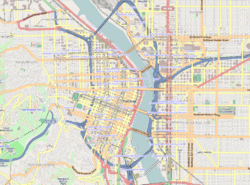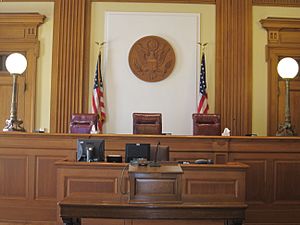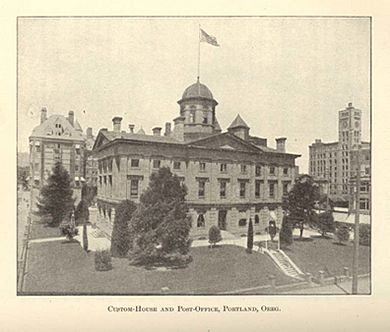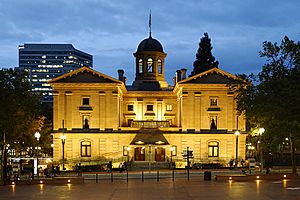Pioneer Courthouse facts for kids
|
Pioneer Courthouse
|
|
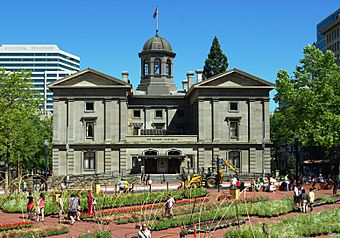
The Pioneer Courthouse as viewed from Pioneer Courthouse Square after 2005 renovations.
|
|
| Location | 700 SW 6th Avenue Portland, Oregon |
|---|---|
| Built | 1869 |
| Architect | Alfred B. Mullett |
| Architectural style | Italianate |
| NRHP reference No. | 73001582 |
Quick facts for kids Significant dates |
|
| Added to NRHP | March 20, 1973 |
| Designated NHL | May 5, 1977 |
The Pioneer Courthouse is a very old and important federal building in Portland, Oregon, United States. It started being built way back in 1869! This makes it the oldest federal building in the Pacific Northwest area. It's also the second oldest federal building west of the Mississippi River.
This building is a key part of downtown Portland, just like Pioneer Courthouse Square. Many people also know it as the Pioneer Post Office. That's because a popular post office was inside until 2005. Today, the courthouse is one of the main places where the United States Court of Appeals for the Ninth Circuit holds important legal meetings. It also has offices for judges who work in Portland.
History of the Pioneer Courthouse
The Pioneer Courthouse was built in different steps between 1869 and 1903. The first person to work there was Judge Matthew Deady in 1875. Back then, the building was called the United States Building.
The Pioneer Courthouse has been saved many times from being torn down. It has always kept working as a federal building. On March 20, 1973, it was added to the National Register of Historic Places. This list helps protect important historical sites. In 1977, it was named a National Historic Landmark, which is an even higher honor.
Saving the Historic Building
In March 1933, a city engineer named Olaf Laurgaard suggested tearing down the building. He wanted to make space for a parking garage. But many people wanted to save this special building.
John C. Ainsworth asked Oregon politicians, Charles Martin and Charles L. McNary, for help. He wanted President Franklin D. Roosevelt to give the building to the city of Portland. The city would then fix it up for groups like the Oregon Historical Society.
However, this idea didn't work out. It was a difficult time, and giving away a post office was likely against the law. Many people, including architects and newspapers, strongly disagreed with destroying the building. They worked hard to keep it safe.
Modern Updates and Changes
In 2003, there were plans to update the courthouse. This led to a disagreement between two Portland politicians, Earl Blumenauer and David Wu. David Wu wanted to move the post office out of the building. He also wanted to add five parking spots in the basement.
Wu's plan was chosen. The building had a big renovation that cost $23.4 million. It was finished in December 2005. During this work, special devices were added to protect the building from earthquakes. A secure parking area for judges was also built under the building. The main lobby, where the post office used to be, was also updated.
 | Aurelia Browder |
 | Nannie Helen Burroughs |
 | Michelle Alexander |


